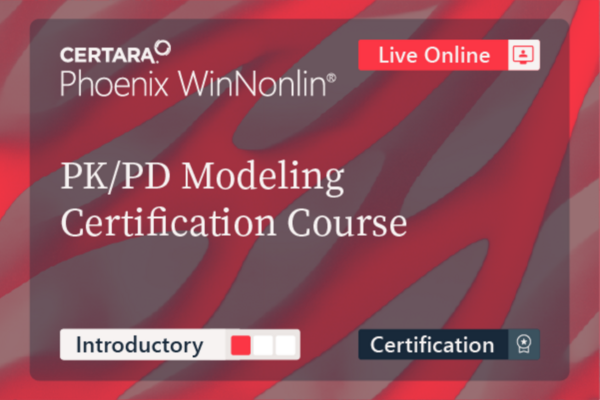
March-April 2026 Cost - $550 (Academia $275, Africa/India $150) Certification Course Overview This certification course focuses on compartmental PK/PD modeling using Phoenix WinNonlin. Participants will learn to build and customize Maximum Likelihood models, evaluate model adequacy, and use simulations to inform dosing decisions. The course emphasizes hands-on experience with Phoenix’s Graphical Model Editor and includes both theoretical and practical components. Course Structure Total Duration: 18 hours of live sessions + 5 self-paced exercises Live Components: - 6 × 2-hour lecture/demo sessions - 6 × 1-hour hands-on group exercises Access: Recordings available for 3 months post-course Prerequisites Familiarity with Phoenix and basic PK concepts is recommended. Suggested prep courses: (122-LIVE-CERT) Phoenix WinNonlin (Part 1) NCA Certification Course (103-OD) Fundamentals of Pharmacokinetics 2026 Live Sessions - Lecture/Demo: Tuesdays, March 10 – April 14 (10AM–12PM ET) - Hands-on Exercises: Fridays, March 13 – April 17 (11AM–12PM ET) Who Should Attend This course is ideal for: - Scientists and analysts working in pharmacokinetics, pharmacodynamics, or pharmacometrics - Clinical pharmacologists seeking to learn PK/PD modeling skills - Professionals using Phoenix WinNonlin for drug development or regulatory submissions - Academic researchers and graduate students who work with drug development - Anyone who has completed the NCA certification course and wants to develop skills in modeling and simulation Certification Exam Software: No installation required; interactive simulation based on Phoenix WinNonlin 8.4/8.5 Structure: Two parts - Part 1: 1 hr 45 min - Part 2: 75 min Content: 80–90 questions covering theory and practical application Passing Score: 75% on both parts Attempts: Two included Topics: PK/PD theory, model building, simulations, error models, graphical/textual model editing Time Commitment Estimated 5 hours/week for live sessions and assignments, plus up to 6 hours for the certification exam Software Requirements Phoenix WinNonlinTM license required Participants are expected to have a current license to Phoenix WinNonlin. If a 60-day software license is needed one can be provided for an additional fee. Contact us if you want to order a license. Pricing Cost - $550 (Academia $275, Africa/India $150) Users requesting an Academic membership will only be accepted with proof of academic status by using an active academic email address. Users from Africa/India will need to provide Certara University with a copy of their government issued proof of residency. If an email address fails to meet that standard, the individual will be notified and will not be given access to the requested membership type. Session Topics Week 1 main session: Course overview, motivation for modeling and simulation, introduction to PK modeling, exploratory data analysis, introduction to the Maximum Likelihood Model object. Week 1 hands-on exercise session: Examine results of IV-bolus model (previously executed), examine results of PO model (previously executed). Week 2 main session: Review of PK modeling, structural models (administration, time lag, number of compartments, etc.), secondary parameters, data structure for compartmental modeling Week 2 hands-on exercise session: Create 1-compartment IV-bolus model, create 2-compartment IV-bolus model, decide which model better fits the data. Week 3 main session: How to obtain initial estimates, residual error models, interpretation of model results. Week 3 hands-on exercise session: Create 1- and 2-compartment models for the PO data, compare models and decide which better fits the data, determine the best residual error model for the data. Week 4 main session: simple simulations, comparing models, how to report individual modeling results. Week 4 hands-on exercise session: Create a basic simulation, create a simulation using ADDL, develop a safe and efficacious dosing regimen. Week 5 main session: Simulations (NPS, ADDL and SS), graphical model editor (including a simple TMDD). Week 5 hands-on exercise session: Use graphical editor to create IV/PO model, determine bioavailability. Week 6 main session: Advanced topics (modeling metabolites, selection of time points, troubleshooting, text mode), demo of PD, discuss population modeling, quick demo of naive pooled population model, closing remarks. Week 6 hands-on exercise session: Use graphical model editor, use textual model editor. Read more
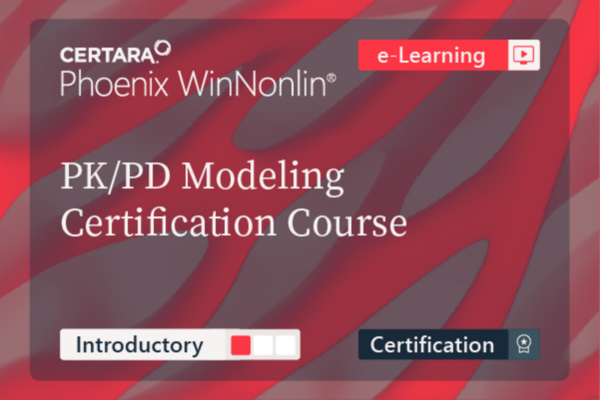
Cost - $550 (Academia $275, Africa/India $150) Certification Course Description In this course you will learn the theory and application of compartmental PK modeling. You will learn how to create Maximum Likelihood PK models using Phoenix WinNonlin software (version 8.3.x), and how to use those models to perform simulations. You will use models to make decisions, such as evaluating different dosing regimens with respect to safety and efficacy. In addition to using the built-in "library" models, you will learn to use the Graphical Model Editor to customize PK models. The course includes lectures, practice exercises and quizzes. Course Format and Access This course format is an 'On Demand' e-Learning course which means that the course is presented as a series of interactive modules that can be completed on your own schedule. You will have access to this course for 3 years. No manual or printed material is associated with this course. Note that Certara University also offers the content of this course as a live instructor-led course format (123-LO), which is considered a different course. For times and availability for the live course, click here. Pricing The price of this course is $550 (Academic $275, Africa/India $150) Users requesting an Academic membership will only be accepted with proof of academic status by using an active academic email address. Users from Africa/India will need to provide Certara University with a copy of their government issued proof of residency. If an email address fails to meet that standard, the individual will be notified and will not be given access to the requested membership type. Language and Course Length This course is delivered in English, with closed captions (which can be turned on/off as desired). The course has a total of approximately 2 hours of interactive content. Learners should plan to spend at least 12 hours to complete the course. Certification Exam This course includes a certification exam. To obtain credit for this course and earn a Certara Certification as a PK/PD Modeler using Phoenix WinNonlin version 8.4 or 8.5, candidates need to earn a passing score on the exam. The exam validates proficiency and competence with Maximum Likelihood Models in Phoenix WinNonlin. Exam Details Software: There is no requirement to have the Phoenix WinNonlin™ software installed to take the exam. The exam has interactive questions embedded that simulate the software. Those interactive questions are based on Phoenix WinNonlin 8.4 or 8.5. Grading: To successfully earn the PK/PD Modeler certification, a minimum passing score of 75% must be achieved on both parts of the online accreditation exam. Each registration includes 2 attempts at passing each part of the test. The exam tests 80-90 questions that cover theoretical knowledge of PK/PD modeling, and a practical section that evaluates software proficiency by performing tests related to model building, evaluating model adequacy, comparing models, conducting simulations and customizing models using the Graphical Model Editor. Time Limit: The exam is divided into 2 parts. There is a time limit of 1hr 45min to complete part 1, and 1hr 15min to complete part 2 of the exam. The clock starts counting when the user clicks on 'Start Exam' in each part. Exam Content: Successful candidates should know both theory and practice of PK/PD modeling, from model building to simulation. Certification topics include: Theory and Practice of PK/PD Modeling Determining Initial Estimates Residual Error Evaluate Model Adequacy and Compare Models Data Manipulation (Phoenix Data Tools) Customizing Models (Graphical Model Editor) Conducting Simulations Reporting Modeling Results Prerequisites and Time Commitment Learners should be familiar with basic operations in Phoenix, including plotting and running NCA. We recommend completing the course (122-OD-CERT) Phoenix WinNonlin (Part 1) NCA Certification Course prior to taking this course. Software Phoenix WinNonlinTM Participants are required to have a current license of Phoenix. The exercises can be completed without a license but it is recommended that students practice on their own. Read more
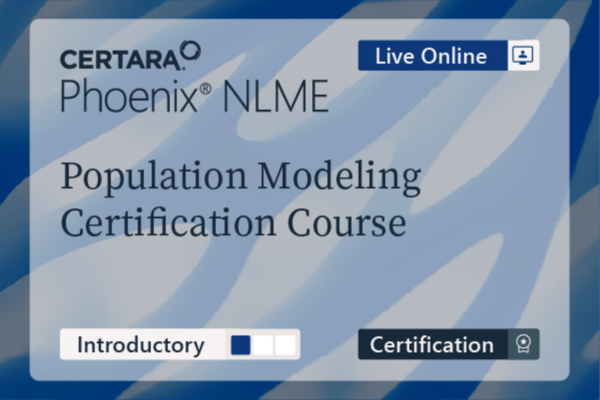
April-May 2026 Cost - $550 (Academia $275, Africa/India $150) Certification Course Overview This course trains Phoenix WinNonlin users to perform population PK modeling using Phoenix NLME. Population PK/PD modeling is increasingly used in regulatory submissions due to its ability to handle sparse or pooled data and quantify variability in PK parameters across individuals. Through hands-on exercises, learners will build population PK models, incorporate covariates to explain variability, and validate models using bootstrap and VPC. The course also covers essential theory to support effective model development and interpretation. Course Structure Total Duration: 18 hours of live sessions + 5 self-paced exercises Live Components: - 6 × 2-hour lecture/demo sessions - 6 × 1-hour hands-on group exercises Access: Recordings available for 3 months post-course Prerequisites Fundamental knowledge of PK/PD concepts including basic compartmental models. Familiarity with the functionality of Phoenix WinNonlin software. Recommended background courses include: (103-OD) Fundamentals of Pharmacokinetics either (122-LIVE-CERT) or (122-OD-CERT) Phoenix WinNonlin (Part 1) NCA Certification Course either (123-LIVE-CERT) or (123-OD-CERT) Phoenix WinNonlin (Part 2) PK/PD Modeling Certification Course Live Sessions - Lecture/Demo: Tuesdays, April 21 – May 26 (10AM–12PM ET) - Hands-on Exercises: Fridays, April 24 – May 29 (11AM–12PM ET) Who Should Attend This course is ideal for: - Scientists and analysts working in pharmacokinetics, pharmacodynamics, or pharmacometrics - Clinical pharmacologists seeking to learn population PK/PD modeling skills - Professionals using Phoenix WinNonlin for drug development or regulatory submissions - Academic researchers and graduate students who work with drug development - Anyone who has completed the PK/PD modeling certification course and wants to develop skills in population modeling and simulation Certification Exam Software: No installation required; interactive simulation based on Phoenix WinNonlin 8.4/8.5 Structure: Two parts - Part 1: 1 hr 45 min - Part 2: 75 min Content: 80–90 questions covering theory and practical application Passing Score: 75% on both parts Attempts: Two included Topics: population PK theory, data preparation, exploratory data analysis, model development, covariate models, covariance models, model comparisons, model validation (VPC and bootstrap), reporting population model results. Time Commitment Estimated 5 hours/week for live sessions and assignments, plus up to 6 hours for the certification exam Software Requirements Phoenix WinNonlinTM and Phoenix NLME licenses are both required Participants are expected to have a current license to Phoenix WinNonlin and NLME. If a 60-day software license is needed one can be provided for an additional fee. Contact us if you want to order a license. Pricing Cost - $550 (Academia $275, Africa/India $150) Users requesting an Academic membership will only be accepted with proof of academic status by using an active academic email address. Users from Africa/India will need to provide Certara University with a copy of their government issued proof of residency. If an email address fails to meet that standard, the individual will be notified and will not be given access to the requested membership type. Session Topics Week 1 main session: course logistics, quick overview of population PK/PD methodology, overview of Phoenix, exploratory data analysis, overview of compartmental models, Phoenix model object, model assessment. Week 1 hands-on session: perform exploratory data analysis, create individual models, compare models. Week 2 main session: overview of 2 stage approach, structural model building, comparing models, residual error models, examine covariate relationships, naïve pool approach, FOCE-ELS. Week 2 hands-on session: create phase 1 pop model with covariates, add covariates, set run options and update model, evaluate model fit, examine covariate relationships, test if removing time lag improves model, compare population models. Week 3 main session: review of lecture 1 and demonstration with phoenix NLME, shrinkage, covariates effects, the Phoenix Model Comparer. Week 3 hands-on session: create phase 3 model with covariates, evaluate phase 3 model and revise model, examine covariate relationships, conduct covariate search, create covariate model. Week 4 main session: demonstration with Phoenix NLME, covariance analysis, model qualification: bootstrap/VPC, external validation, reporting population models. Week 4 hands-on session: explore covariance models, conduct VPC on models, bootstrap (if time permits). Week 5 main session: model simulation, visual predictive check. Week 5 hands-on session: population simulations, determine dosing regimen for sub-groups. Week 6 main session: sequential PK/PD, plots within Phoenix using R-script, Phoenix BQL options, Phoenix model run options, additional population engines. Week 6 hands-on session: TBA Read more
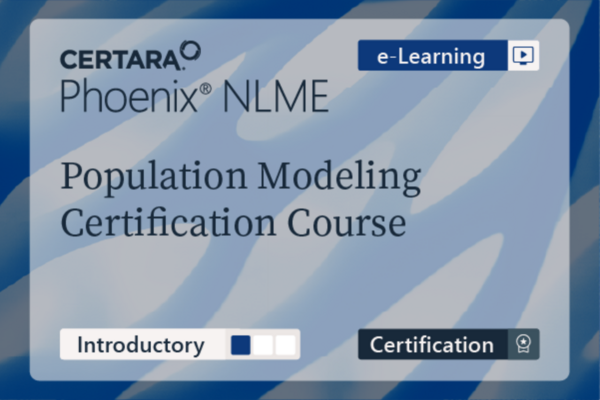
Cost - $550 (Academia $275, Africa/India $150) Certification Course Description The objective of this course is to learn how to perform population PK using Phoenix NLME. Population PK/PD modeling is being used increasingly in regulatory submissions. Population PK modeling can handle sparse data and also data combined from several studies. The population approach estimates the variability between subjects in the PK parameters and can help you understand potential sources of PK variability. Through a series of practical exercises, learners will create population PK models, add covariates to models to help explain and quantify individual variation, and validate their models using bootstrap and VPC. Learners will become familiar with the theory necessary to make effective use of population modeling. You will have access to this course for 3 years. No manual or printed material is associated with this course. Pricing Cost - $550 (Academia $275, Africa/India $150) Users requesting an Academic membership will only be accepted with proof of academic status by using an active academic email address. Users from Africa/India will need to provide Certara University with a copy of their government issued proof of residency. If an email address fails to meet that standard, the individual will be notified and will not be given access to the requested membership type. Course Format, Language and Dates This course format is 'e-learning', which means that you can take the course at your own pace. The course materials include recorded lectures and interactive tasks. You will be asked to carry out tasks in a simulation of Phoenix. You will interact by clicking and entering text. Although it will look and feel like you are interacting with Phoenix, the simulation is not a real instance of Phoenix. It can only go through the task that was assigned. This course audio is in English, with closed captions that can be turned on or off. Certification Exam This course includes a certification exam. To obtain credit for this course and earn a Certara Certification as a PK/PD Modeler using Phoenix WinNonlin version 8.4 or 8.5, candidates need to earn a passing score on the exam. The exam validates proficiency and competence with Maximum Likelihood Models in Phoenix WinNonlin. Exam Details Software: There is no requirement to have the Phoenix NLME™ software installed to take the exam. The exam has interactive questions embedded that simulate the software. Those interactive questions are based on Phoenix NLME 8.4 or 8.5. Grading: To successfully earn the Population Modeler certification, a minimum passing score of 75% must be achieved on both parts of the online accreditation exam. Each registration includes 2 attempts at passing each part of the test. The exam tests 80-90 questions that cover theoretical knowledge of population modeling, and a practical section that evaluates software proficiency with population models in Phoenix NLME. Time Limit: The exam is divided into 2 parts. There is a time limit of 1hr 45min to complete part 1, and 1hr 15min to complete part 2 of the exam. The clock starts counting when the user clicks on 'Start Exam' in each part. Exam Content: Successful candidates should be able to use Phoenix NLME to create population models, including covariate analysis, covariance analysis, model validation, and simulation. Exam topics include: Population PK Theory Data Preparation Exploratory Data Analysis Model Development Covariate Models Covariance Models Model Comparisons Model Validation (VPC and Bootstrap) Reporting Population Model Results Prerequisites and Time Commitment Fundamental knowledge of PK/PD concepts including basic compartmental models. Familiarity with the functionality of Phoenix WinNonlin software. Recommended background courses include: (103-OD) Fundamentals of Pharmacokinetics either (122-LIVE-CERT) or (122-OD-CERT) Phoenix WinNonlin (Part 1) NCA Certification Course either (123-LIVE-CERT) or (123-OD-CERT) Phoenix WinNonlin (Part 2) PK/PD Modeling Certification Course The course provides approximately 6.5 hours of video instruction which includes a practical component that you can do at your own pace. It is expected to take participants about 24+ hours to complete, including time to perform the tasks in Phoenix. Software Phoenix WinNonlin and NLME Participants are expected to have current licenses for both Phoenix WinNonlin and Phoenix NLME. If a 60-day software license is needed one can be provided for an additional fee. Contact us if you want to order a license. Read more
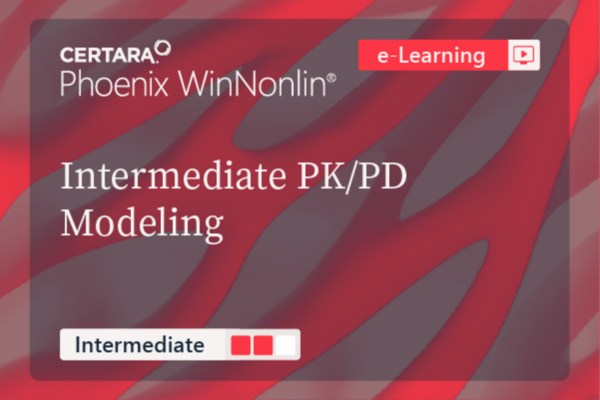
Cost - $1000 (Academia $500, Africa/India $250) Course Description This course focuses on PK/PD individual data analysis using PK compartmental models and PK/PD models. The intermediate PK/PD course will teach you how to set the models in Phoenix WinNonlin and how to interpret the results. The course will guide you through the process of selecting the best model and how to make predictions with the final model. Model selection is performed selecting library models, building the model graphically or coding the model in PML language. Course topics include nonlinear modelling theory, fitting PK data, effect compartment PK/PD models, direct and indirect response PK/PD models, analyzing binary data, designing better studies and combining data among subjects. A high level overview of population methods is provided (Note that population methods are covered in detail in courses that use Phoenix NLME). The concepts of each topic are explained in detail via instructional videos. Exercises are introduced and you are expected to practice concepts learned by performing the exercises on your own. Step by step solution videos are also provided to check your work. Your understanding of the concepts discussed is tested via short quizzes throughout the course. If you are an academic user, please contact us so we can update your account profile to give you access to academic pricing. Note that you must register with an email address that is associated with an academic institution to get academic pricing. If you are located in Africa or India, please contact us so we can so we can update your account profile to give you access to the Africa/India pricing. You will need to provide proof that you are physically located in India to get the pricing. Software Used Phoenix WinNonlin™ A temporary (30-day) license is provided to subscribers of this course. When you are ready to start the practice exercises in this course, contact us to request your license. Accessing the Course After registering for this course, login to www.certarauniversity.com and see the course under the Catalog Section ‘My Courses’. You will have access to this course for a period of 3 years after the purchase. The purchase is for a single seat in the course. No sharing the login between different individuals is allowed. Additional seats must be purchased if more than one person wishes to take the training course. Course Length: The course provides approximately 16 hours of video instruction which includes a practical component that you can do at your own pace. It is expected to take participants about 40+ hours to complete, including time to perform the tasks in Phoenix. Prerequisites It is assumed that learners have familiarity with NCA and individual PK/PD modeling, a good background in pharmacokinetics and pharmacodynamics, and prior experience with the Phoenix is recommended. Participants should also be able to perform the tasks in the following Certara University courses: Introduction to Phoenix WinNonlin (Part 1) - NCA (122-OD-CERT or 122-LIVE-CERT) Introduction to Phoenix WinNonlin (Part 2) - Modeling (123-OD-CERT or 123-LIVE-CERT) Instructor Ana Henry has extensive experience in a variety of roles in the Pharmaceutical industry. Most recently she acted as product manager for the complete suite of Certara Pharsight desktop products, personally leading the development of Phoenix®, the industry’s premier PK/PD software platform. Currently, she is with Certara University’s Scientific Training and Education Department, tasked with training and content development of on-demand courses. Ana has extensive experience in software demonstration and training and is adept at offering technical expertise and evaluation of software products. She has trained and provided support for Phoenix WinNonlin, Phoenix Connect, Phoenix NLME, Pharsight Knowledgebase Suite, AutoPilot, PKS Reporter, Trial Simulator, and PK/PD methodology courses. Prior to Certara, Ana worked in the pharmaceutical industry as a biostatistician and a pharmacokineticist, designing, analyzing and reporting on clinical studies. Ana is also a regular guest speaker in the graduate PK/PD course at the University of Colorado Skaggs School of Pharmacy and Pharmaceutical Sciences. Read more
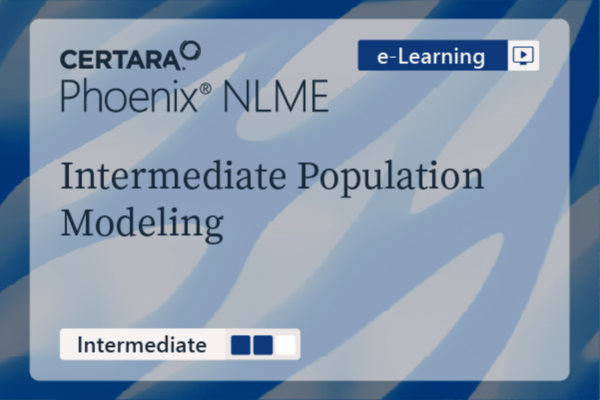
Cost - $1,000 (Academia $500, Africa/India $250) Course Description This course will help you fill the gaps to become a better Population Pharmacokinetic and Pharmacodynamic (PK/PD) modeler. This e-learning course focuses on Population PK/PD modeling and simulation using the intuitive interface of Phoenix NLME. This course topics include: population PK analysis with covariates, covariate search methods, complex PK models including multiple absorption processes and parent-metabolite models, Emax PK/PD models, an introduction to categorical response PD models, and modeling BLQ data in Phoenix NLME. The concepts of each topic are explained in detail via instructional videos. Exercises are introduced and you are expected to practice concepts learned by performing the exercises on your own. Step by step solution videos are also provided to check your work. Your understanding of the concepts discussed is tested via short quizzes throughout the course. If you are an academic user, please contact us so we can update your account profile to give you access to academic pricing. Note that you must register with an email address that is associated with an academic institution to get academic pricing. If you are located in Africa or India, please contact us so we can so we can update your account profile to give you access to the Africa/India pricing. You will need to provide proof that you are physically located in India to get the pricing. Software Used Phoenix NLME™ A temporary (30-day) license is provided to subscribers of this course. When you are ready to start the practice exercises in this course, contact us to request your license. Accessing the Course After registering for this course, login to www.certarauniversity.com and you will see the course on your Dashboard. You will have access to this course for a period of 3 years after the purchase. The purchase is for a single seat in the course. No sharing the login between different individuals is allowed. Additional seats must be purchased if more than one person wishes to take the training course. Course Length: The course provides approximately 10 hours of video instruction which includes a practical component that you can do at your own pace. It is expected to take participants about 40+ hours to complete, including time to perform the tasks in Phoenix. Prerequisites It is assumed that learners have familiarity with individual PK/PD modeling as well as introductory level population PK/PD modeling experience. Participants should have a good background in pharmacokinetics and pharmacodynamics, and prior experience with the Phoenix is recommended. Participants should also be able to perform the tasks in both the following Certara University courses: Intermediate PK/PD Modeling using Phoenix WinNonlin (On-Demand 200-OD) Introduction to Population PK/PD Modeling using Phoenix NLME (On-Demand 101-OD) Instructor Christopher Mehl Christopher Mehl is a Senior Software Trainer with Certara University, and has been with Certara since 2003. His educational background is a BS in Molecular Biology from the Ohio State University, and an MS in Pharmacology from the University of Wisconsin. He has conducted over 200 training courses with Certara products such as Phoenix WinNonlin, IVIVC, NLME, PKS, and Trial Simulator. These include workshops at the US Food and Drug Administration, universities, customer sites, and courses open to the public. Read more
Shopping Cart
Your cart is empty
